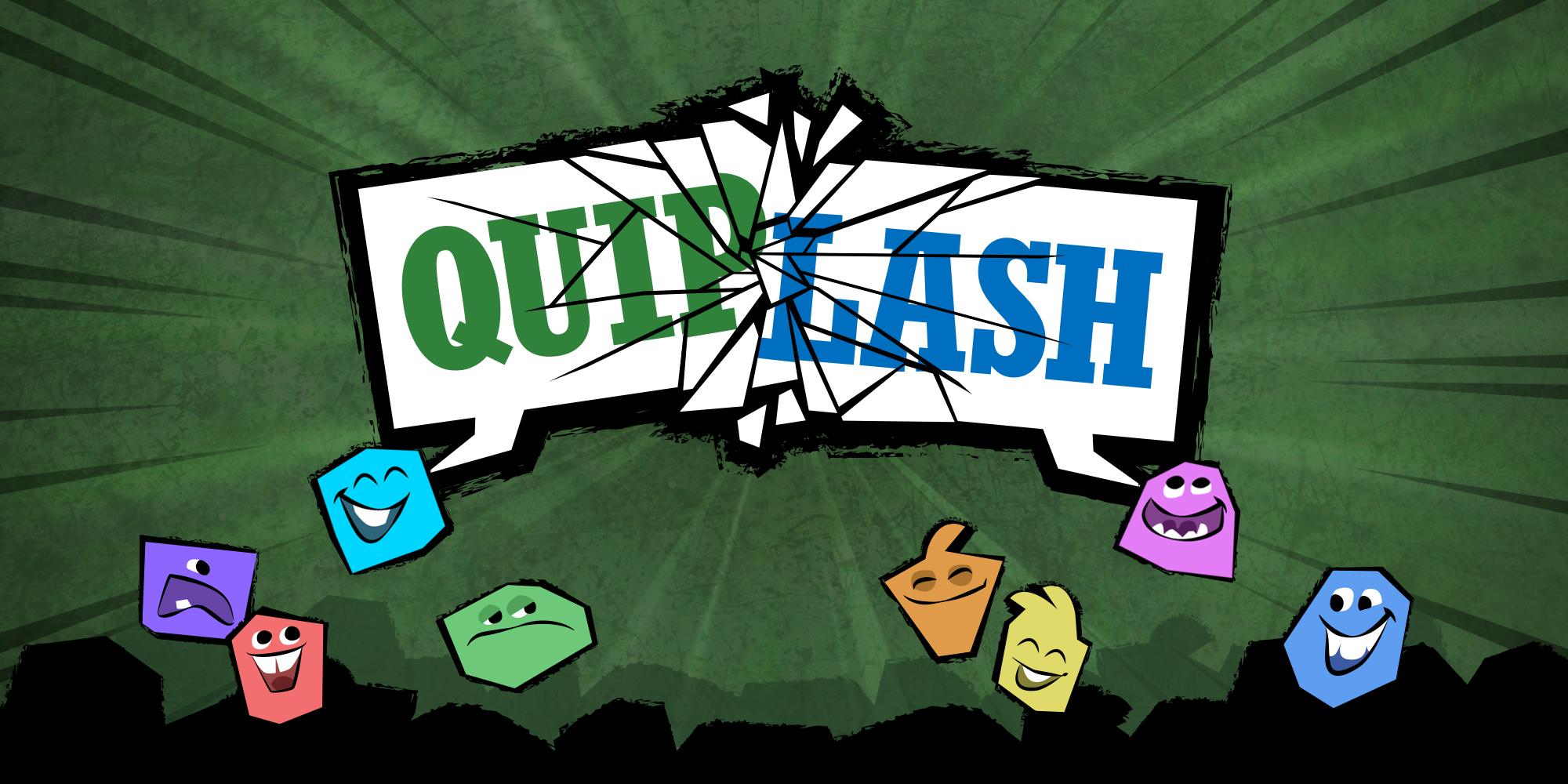Overview
Quiplash is a judging-based party game developed by Jackbox Games and is available for several different platforms including PC/Mac through Steam, as well as consoles such as PS3, PS4, or the Nintendo Switch. It supports between 3-8 players who join from their own device (desktop or mobile) using a game code. The game doesn’t have an advertised target audience, but they note on their website that they have an optional family-friendly setting, so kids could definitely play Quiplash. I would say that the target audience is probably ages 8 and up (although the winning answers may vary heavily depending on age group, so it might be best to play in a group with similar ages).
Formal Elements
Quiplash is a multilateral competition where the objective of each player is to earn the most points. The game is structured over three rounds, and whoever has the most points by the end of the game wins. Players earn points by giving humorous answers to prompts such as “Something you’d be surprised to see a donkey do” or “If you really, really love something, let it ___”, and having others vote for their answers.

The first two rounds proceed as follows: Every player is given two prompts and must submit their answers to both prompts before time runs out. Each prompt is given to two players. Then, the answers to each prompt are pitted against each other and the remaining players must vote for which one they think is funnier. The player who wrote the answer with more votes earns a certain number of points. The third round, known as the “Last Lash”, has every single player write an answer to the same prompt. Then, players are given a certain number of votes to distribute between the answers however they want. Players earn points proportional to the number of votes they received.
The only resource that players have to use during the game is their brain — there aren’t any power-ups, or cards that players are required to choose their answers from. This means infinite creative freedom and stands in contrast to many other similar games!
Kinds of Fun
The main kind of fun that Quiplash facilitates is Fellowship since players are encouraged to make each other laugh, as that is what will let them win the game. There is also a lesser element of Challenge that results from the competition, but this is definitely secondary. As my friend beautifully put it, “I feel like we’re making each other laugh and that’s what matters. The competition is dumb”.
What Works? What Could Be Improved?
What Works
- Simplicity: I think that at its core, Quiplash is a very simple game (all each player has to do is write two answers and then vote for other answers), which makes it feel like you get a lot of bang for your buck. Essentially, you need to put in a small amount of upfront effort to write the two answers, and then you get to enjoy yourself for 10 minutes reading everyone else’s answers.

What Could Be Improved
- Make point distributions more even across rounds: Since the final round is worth so many more points, it can completely change the course of the game and make previous rounds feel unimportant. While this adds an element of excitement to the game, it can also feel unfair to players who did very well in previous rounds only to be wrecked by points in the last round. One friend I played with remarked “I hate the last lash. It’s essentially winner takes all”, which is a telling quote.
- More customization: Since Quiplash is a digital game, it seems like it would be easy to have players write in their own prompts (specific to their friend group, e.g. “What’s one thing X can’t live without?”) to make the game more enjoyable.
Competitive Advantage
There are two main mechanics within Quiplash that I think differentiate it from other similar humorous judging games like Cards Against Humanity or What Do You Meme:
- Writing in answers: Because Quiplash is a digital game, it’s much easier to have players write in their answers instead of picking from a pre-determined set of cards. This makes it easier for players to be creative (especially since we’ve all had that moment in Cards Against Humanity where none of the cards really fit the prompt..). It also means that players can specifically design their humor to appeal to the group that they’re playing with, and make the game more personalized by incorporating inside jokes.
- Pitting two answers against each other: This is a mechanic that I feel is pretty unique to Quiplash, which pits two answers against each other and has the rest of the players vote, instead of having all the players except one submit an answer and the moderator vote. In my opinion, this offers two advantages: 1) It’s easier for those voting to choose an answer, since it’s much easier to compare 2 answers to each other than pick the best of out 5 (or 7, or 8…). 2) The game feels fairer towards players since points are less dependent on the individual humor of the person voting that round, but rather on a group vote (although this doesn’t work as well in Quiplash with 3 players since one person essentially chooses who wins each round).
Vulnerability
Depending on who you’re playing with, Quiplash can sometimes still lead to surprising amounts of vulnerability! I played with my two closest friends, so often answers that won made references to our inside jokes or made self-deprecating quips. One memorable moment happened in response to the prompt “If you really, really love something, let it ___”: Giulia and I were answering the prompt, and Claudia was voting. Giulia answered “go bc you self-sabotage your feelings”, and after picking that answer, Claudia proceeded to exclaim “Wait! That was YOU?! I thought it was Nadin” (😢). That being said, the vulnerability that we displayed wasn’t really a required feature of the game, and it’s totally possible to play Quiplash with more general humor/jokes.
- Formal elements of the game: how many players? What actions can players take? How do rounds work? Do they do anything interesting with player relationships/objectives/resources?
- What kind of fun? How do the elements of the game lead it to be fun/compelling?



